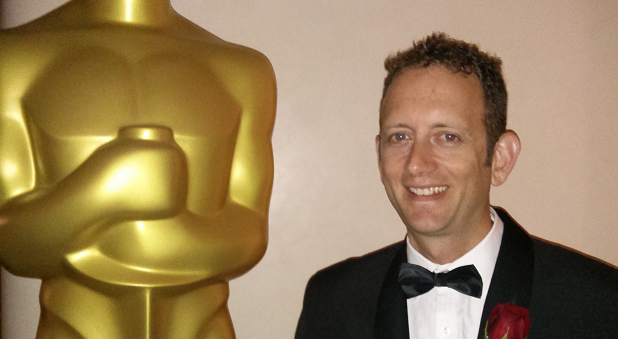A Sydney Anglican has won a Technical Achievement Academy Award, for his contributions to computer generated visual effects and compositing technologies.
Chris Cooper, a Lalor Park resident and attendee at St Peter’s Seven Hills, received the award in Los Angeles on February 15th, at a prelude to the main Oscar awards taking place in March.
Mr Cooper received the award for development work begun in 2007 when working for Sydney based animation and visual effects studio Animal Logic. The workers at the studio, and other studios conducting similar work, were all recognised with Academy Awards.
“My current employer actually helped me to get over there to be there in person to receive the award, which was great,” says Mr Cooper. “It was a big dinner ceremony, and they had the awards interspersed throughout that. It was hosted by Kristen Bell and Michael B Jordan, and we got to go up and make speeches, so it was all quite exciting… It was in Beverley Hills, and we [Chris and his wife Solveig] had a few days to look around. We were having the kids minded, so we didn’t want to spend too long over there.”
The specific work done by Mr Cooper was focused on integrating characters and figures with computer generated areas, particularly computer generated smoke and dust, in a process generally known as compositing. The particular compositing method developed at Animal Logic was first used in the 2008 Baz Luhrmann film ‘Australia’, and was later also used in ‘Legend of the Guardians’. It has now become an industry standard approach.
Mr Cooper now works for NICTA, Australia’s Information and Communication Technologies Research Centre, as a software engineer. He says part of the reason he left the film industry was because of the hours required, and while he is thankful for the time he spent in it, and also for the recognition he has received, he wanted to be able to spend more time with his family and at church.
“With the industry being what it is, and with various tax incentives in different countries, a lot of people will follow the work around, work really hard, and then take a chunk of time off,” he says. “I believe it’s important to invest in children, in particular, and that was a hard thing to implement in the industry.Towards the end of a project, you can easily be working 12 hour days, six or seven days a week, and that makes it hard to be a decent father, and husband, or even to go to church regularly.
He also says that he finds it interesting, in a way, that much of the work that he and other visual effects artists and engineers do is essentially trying to reinvent the wheel, and recreate reality on a smaller screen.
“One of the thoughts I used to ponder on was how much work we do imitating what God has already created,” says Mr Cooper, “to try and simulate what happens in real time all around us. In the work I was doing, we were trying to make things look like they were shot by a camera, and so we would attempt to mimic what was around us. We’d throw a lot of computing resources at the problem to try and get there, but we’re still a few steps away. I always just thought that was interesting.”
























